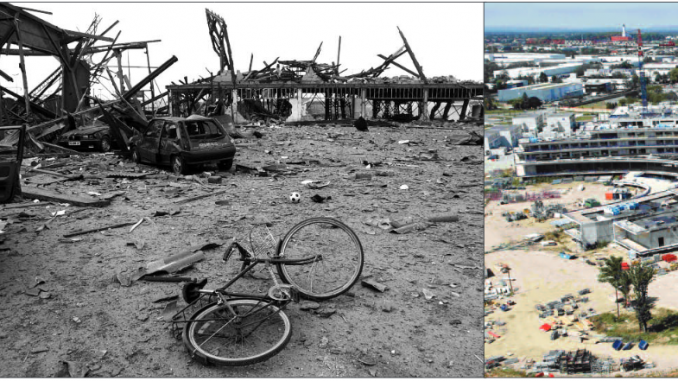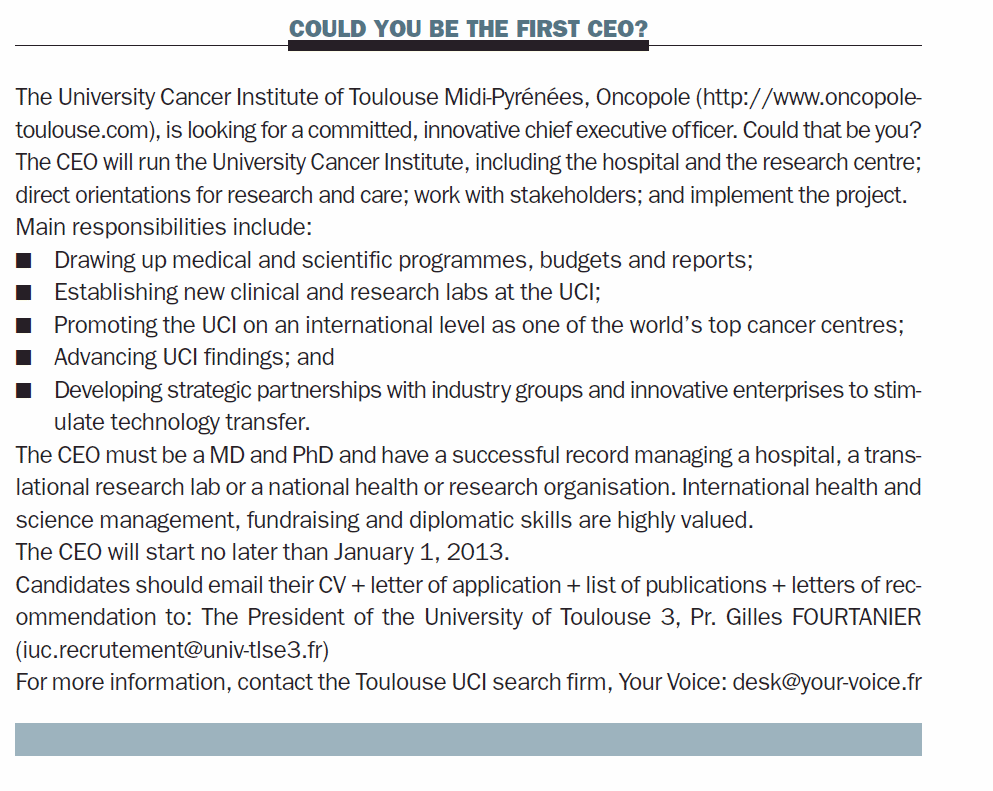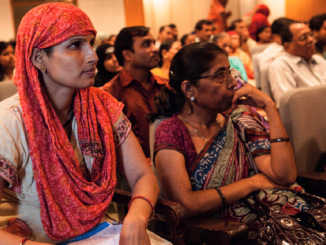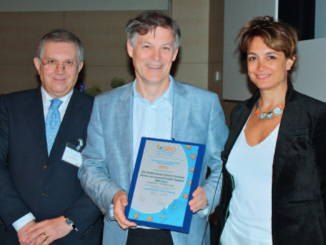
From a disastrous chemical explosion in Toulouse arises an innovative hospital with unique links to research and industry. Jean-Pierre Armand has seen his dream cancer centre at the Toulouse ‘oncopole’ through to completion.
“If only we could start from scratch.” This thought has no doubt crossed the minds of many senior figures in cancer as they try to reshape slow-changing systems and processes to keep up with developments.
Whether integrating biobanking into surgical pathology, convincing smaller hospitals not to treat patients where they lack the necessary experience and expertise, or facilitating cooperation between hospital-based researchers and basic scientists, the option of starting from scratch seems very enticing.
Following a decade-old tragedy, just such an opportunity will soon be bearing fruit in the south of France, with the completion of the Toulouse ‘oncopole’, a public–private partnership which “aims to become the European leader in the field over the next ten years” and will be “dedicated to winning the fight against cancer”.
The brand new campus, covering more than two square kilometres, will be home to a new University Cancer Hospital, attached to a large public–private research facility, geared to collaborating with the hospital in translational research projects. A group of small biotechs using university lab facilities on the oncopole site will link with basic researchers at the city’s highly-rated University of Science and Medicine, and will look for opportunities to develop and market innovations, specialising in selected fields such as the application of nanotechnology in cancer therapies. Completing the oncopole line up will be Pierre Fabre laboratories, which brought the cytotoxic drug vinorelbine to market, and has a particular interest in cancer immunotherapy, and Sanofi, one of France’s biggest pharmaceutical companies.
It all began with a catastrophic event. On 21 September 2001 – 10 days after the 9/11 attacks in the USA – an explosion ripped through an area in the southern part of Toulouse, generating a shock equivalent to an earthquake measuring 3.3 on the Richter scale, or 100 tons of TNT. It was not a terrorist attack, as many initially assumed, but an industrial accident at a large chemical complex. It left 30 people dead and 2500 severely injured, with many school children numbered among the casualties; 40,000 people found themselves temporarily homeless.
It was in response to this disaster that the proposal for the Toulouse oncopole arose. The city needed investment to repair the physical damage and replace jobs. But it also needed something positive on a human level to help heal the wounds and pull the community through a period of shock, mourning and recrimination. Using the devastated industrial wasteland to create a top-class centre focused on the fight against cancer fitted the bill perfectly, and played to the city’s strengths and history. Toulouse is home to one of the earliest centres of radium therapy – the Claudius Regaud Institute, named in 1923 after Marie Curie’s closest clinical collaborator. The city is also very strong in both science and innovation, being home to some of the country’s top-ranking universities, as well as France’s prestigious aerospace industry.
The Toulouse oncopole truly is an opportunity to ‘start from scratch’, says Jean-Pierre Armand, who, to his great delight, was drafted in from the prestigious Gustave Roussy Institute in Paris to oversee the development of the new University Cancer Hospital. In doing so he has helped to create a ‘promised land’ for his successors, although he himself is returning to Paris.
But he has high aims for those who will follow. “The aim is not to improve or update. It is to use the expertise and experience we have in high-quality cancer care to invent new jobs and develop more effective research, discovery of new types of drugs and a better connection between this central hospital and the network of clinics serving three million people in the Midi-Pyrénées region.”
Centred on the hospital
Armand has been an outspoken critic of what he sees as a damaging dislocation between university-based academic medicine and the oncology clinicians who carry out the majority of treatments. He believes the new set up in Toulouse provides an opportunity to get this relationship right, which accounts for his great hopes and infectious enthusiasm. Key to its success, he argues, is having a real cancer hospital at its heart. “This is not the type of place where you just do experiments and get experience. This hospital will be treating cancer patients from the region, just like any other cancer hospital, with real doctors tackling the same treatment dilemmas and attending to the same care needs as in any other hospital.”
Armand expects two major benefits to flow from this. The 30 or so research teams attached to the hospital will be more likely to focus on resolving problems that are a priority for patients and doctors, and more likely to focus on solutions that will be of value and practical to implement in the real world. They will also have access to a very rich source of information emanating from cancer treatment centres throughout the Midi-Pyrénées region. These clinics will routinely feed information back to the new hospital via a custom-built IT system supporting what Armand describes as a ‘living biobank’, designed to capture patients’ clinical and biological information over the course of their disease.
This patient-driven approach should feed through to the work of the biotechs, which will be looking to pick up potentially marketable results. To ensure the relationship between patients and research works to the benefit of both sides, safety mechanisms have been built into the system. One seat on the board of the hospital is reserved for someone with responsibility for the whole of the Midi-Pyrénées, whose function will include ensuring access to clinical trials even for patients located at the furthest periphery of this very large region. An ethics committee will oversee the work of the biotechs and protect the interests of the patients.
Both Sanofi and Pierre Fabre laboratories have long had a presence in Toulouse, but their move to the oncopole is expected to herald a much greater degree of interaction between these pharmaceutical giants and the rest of the research and clinical community in Toulouse. A Sanofi spokesperson talks of the oncopole as “an ecosystem” that “allows liaisons between the research teams, clinicians and patients”. The Sanofi team in Toulouse specialises in early innovation, including in the field of tumour microenvironment, and will, for instance, welcome to its site teams from INSERM – the National Institute for Health and Medical Research.
Bursting with innovation
This collaborative, synergistic approach extends well beyond the confines of cancer science. The aeroplane manufacturer Airbus has been invited to put two representatives onto the board to boost the culture of innovation. And a shared interest has been identified with the aerospace industry in terms of access to a massive and expensive piece of equipment. It turns out that the sort of particle accelerator that is used to fire protons, carbon ions and other large particles for use in a particular variant of radiation therapy (hadron therapy) is the same as that required to test the ability of space materials to withstand exposure to neutrinos. Collaborating to develop such a facility at the oncopole site will give patients from the region access to hadron therapy, while allowing the aerospace industry to test their materials locally rather than sending them to northern Europe.
This is not only about the benefits for Toulouse. Armand and his team are well aware of how rare it was, even before the financial crisis, to get government investment of €300 mn for a project like this, and it comes with a responsibility to the rest of the country and beyond. The ‘living’ biobank is one precious resource that will be made available to the wider research community. There will also be a comprehensive education programme for all the oncology specialisms, including post-doctoral education covering all the jobs to do with oncology, research, industry, medicine.
There is also a unique solution borrowed from the aero industry about what to do with the existing Claudius Regaud Hospital in the centre of Toulouse. Instead of closing it down, it will become a training environment where medical students will learn in a setting as close as you can get to a working cancer hospital. The Claudius Regaud, complete with operating theatres, radiation bunkers, labs, wards, bathrooms and toilets, will become a simulator hospital where students can learn about the different pathways and approaches to all aspects of caring for cancer patients – radiotherapy, chemotherapy, surgery, nursing, psycho-oncology and pathology. Armand is enthusiastic: “We will adopt the technique used by Airbus. When they build a new plane they don’t train pilots first on the real plane, but in a simulator.”
The old hospital – its operating theatres, wards, labs and radiation bunkers – will be used as a simulator hospital
Innovatory approaches to communications is another area Armand is thrilled about. The new IT system now linking the cancer hospital with all the cancer clinics throughout the Midi-Pyrénées does far more than facilitate the ‘living biobank’. It is a crucial component that allows them to deliver on a commitment to care for patients as close to their homes as is safely possible, and will also make it possible for local clinics to participate in clinical trials.
An equally innovative and perhaps recognisably French approach is being taken to ensure fruitful interaction between the clinical staff and the academic researchers who share the same place of work: good food. Some of the communications budget has been used to upgrade catering facilities to the level of a Michelin one-star restaurant, where staff will want to spend time. “That will be a place where the real doctors with their own real problems will discuss with real scientists. Sometimes they have different interests, but they will listen to each other and they will exchange. This is one of the advantages you can have when you work on one site.”
But it is a new thoroughly low-tech approach to communication with patients that Armand is probably most proud of. This innovation has already attracted attention from cancer centres throughout France and beyond. “In my hospital we have discovered that today a patient spends 15 minutes with the doctor in the day, but two hours with the people cleaning the ward. And so we have developed a very thorough communications training for the people cleaning the room.”
Cleaning and other ancillary staff are in a good position to communicate with patients, says Armand, precisely because they are not highly educated. Patients feel relaxed talking to them about how lousy they feel, their hopes and fears for the future, or perhaps just the fortunes of le Téfécé, Toulouse’s premier league football club. “It works fantastically, and now people are contacting us from elsewhere, asking us to come and train their staff or accept them on courses down here.”
Armand feels that this sort of patient-centred approach, when combined with the critical mass of scientific, technical and industry know-how on site, gives the Toulouse oncopole the potential to make an important contribution to the global fight against cancer.
Now he has set up the dream factory, it is for others to make those dreams come true. Armand has overseen every stage of the planning of the new hospital, but it is time for him to pack his bags and head home to Paris. The actual move from the current Claudius Regaud hospital to the new site will take place in 2013 under a new director. In the ten years that have passed since the explosion that started it all, cancer survival has continued its maddeningly slow progress, while the financial crisis now threatens public spending on both health and research. But as Armand points out, the crisis has also mobilised many young people who are impatient for change – les indignés, los indignatos – and this is the spirit he feels in needed to get the most out of the wonderful facilities in Toulouse. “We’ve built the hospital, we have very strong support from patients and families, but we also need determined men and women,” he says. “We have a lot of doctors now who just accept the bad results we have in cancer and are not really fighting to improve them. We now need many of these younger indignés to enter the game.”






